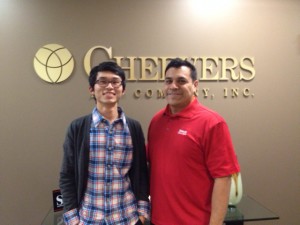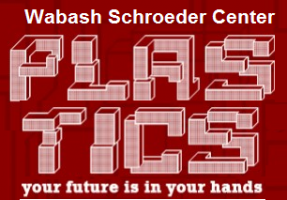Wesley Brown: EPD – Through a series of connections with Wabash College alumni, I was lucky enough to meet Detective Peter DeYoung with the Evansville Police Department (EPD). Detective DeYoung set up a four day long externship for me on the dates of July 20-23, 2016. During this externship I got the opportunity to job shadow the daily lives of three different units within the EPD.
On Wednesday, July 20, I rode along with patrol officer Kyle Thiry on second shift from 3:00pm-11:00pm. During this time I learned about the role and utmost importance of patrol officers in local law enforcement structure. Patrol officers must be almost completely self sufficient, and use critical decision making skills in a timely manner in order to properly serve the public and at times protect themselves. Patrol officers are literally the boots on the ground for law enforcement agencies, and are imperative in solving large and small issues in the community. I did not realize how constant the work of a patrol officer was until Officer Thiry explained the dispatch and response system to me. From the time Officer Thiry and I got into his patrol car, we were continuously on “runs” until the end of his shift. During my ride-along we went on a variety of dispatched runs including criminal mischief, noise complaints, domestic disputes, breaking and entering, and assault in progress. Officer Thiry responded to each call in order of urgency, while simultaneously handling each situation with equal diligence and concern. My ride-along with Officer Thiry was an extremely exciting and eye-opening experience.
On Thursday, July 21, I shadowed a detective with the Intelligence Led Policing (ILP) Unit of the EPD from 12:00pm-5:00pm. Usually this unit leads Gang Task Force operations and enforces the law by utilizing statistical data based on geographically focusing efforts on areas with high concentrations of crime in the city of Evansville. However, on this day I rode with one of the ILP detectives during an important surveillance operation. This was surprisingly the most exhilarating day of my externship because the detective I rode with was forced to exceed the speed limit and make several traffic violations, all in an unmarked pick-up truck in order to keep track of the vehicles we were tailing. From my experience with the ILP Unit, it was clear that being a detective in this unique niche of law enforcement would be a thrilling career.
On Friday and Saturday night, July 22-23, I shadowed EPD Detective and Wabash College alumni Peter DeYoung on third shift from 8:00pm-4:00am. Detective DeYoung was working on about eight different cases and investigations at the time. In order to solve these cases and track down crime suspects, Detective DeYoung utilized unique tools such as county jail phone/video recordings, the EPD database systems, crime scene evidence, and even Facebook. Detective DeYoung has a large amount of freedom within his shift regarding the way he performs his job, as often times he can do things on his own time as long as he completes each case file within a month of the investigations’ completion. During my externship we left the office a few times to look for suspects at locations where they might have been. While shadowing Detective DeYoung, he also interviewed two separate stabbing victims at a local hospital in order to find out what exactly happened in the situation, who the offender was, where they might be, along with any other useful information. It was intriguing to view and learn about the process of criminal investigations from start to finish, in the detectives’ office and in the field. Detective DeYoung said he uses valuable critical thinking skills that he developed during his four years at Wabash College and has been able to sharpen through his career in law enforcement.
This four-day externship was an eye-opening and exciting experience that has ultimately further inspired me to pursue a career in law enforcement. On the last night of the externship Detective DeYoung gave me an application for the EPD and spoke with me in depth about the yearlong application process. With my senior year and graduation from Wabash quickly approaching, the EPD will be one of the law enforcement agencies that I apply for this upcoming school year and hope to be a part of one day. I would like to extend a sincere thank you to Detective DeYoung for his generosity in setting up this invaluable experience. I would also like to thank all the brave men and women of the Evansville Police Department for their service to the community and for welcoming me during my time throughout the department.









